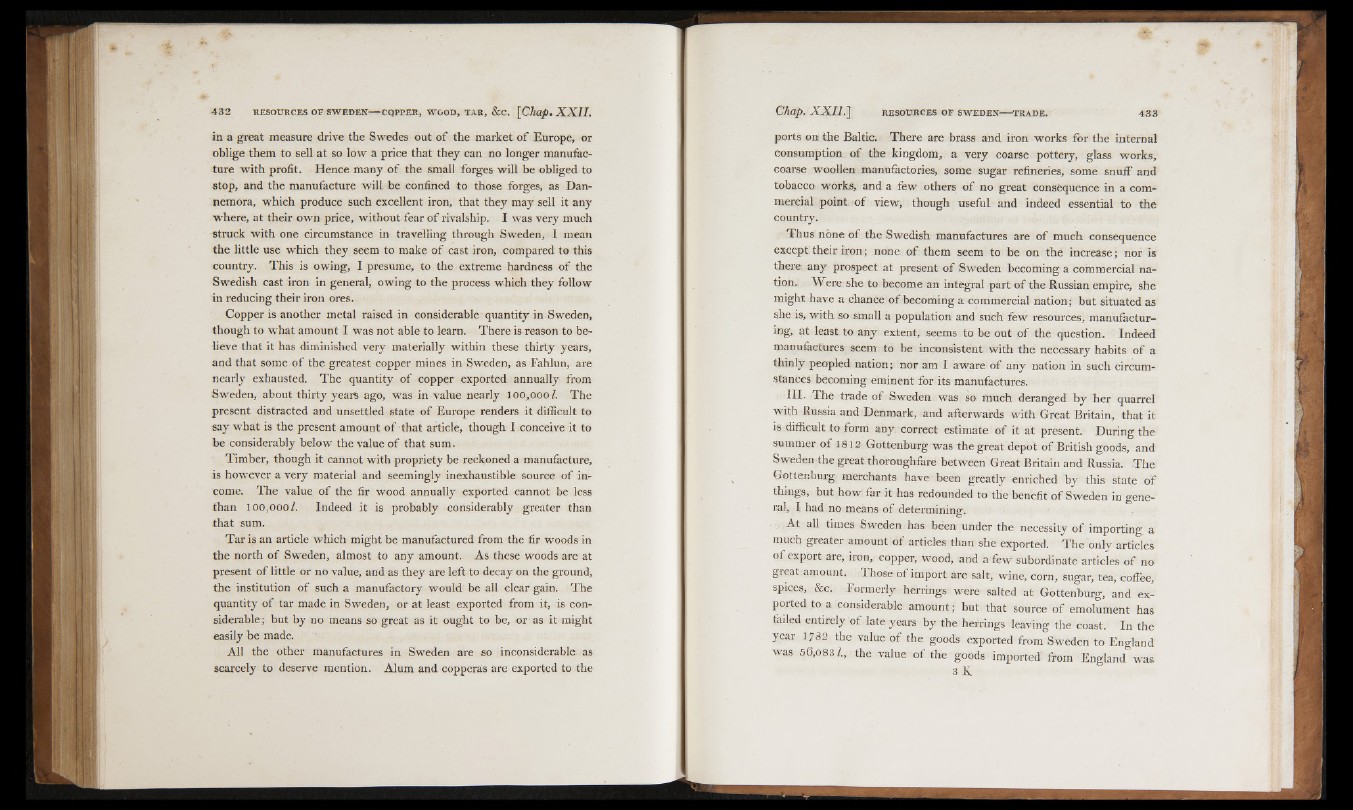
in a great measure drive the Swedes out o f the market o f Europe, or
oblige them to sell at so low a price that they can no longer manufacture
with profit. Hence many o f the small forges will be obliged to
stop, and the manufacture will be confined to those forges, as Dan-
nemora, which produce such excellent iron, that they may sell it any
where, at their own price, without fear of rivalship. I was very much
struck with one circumstance in travelling through Sweden, I mean
the little use which they seem to make of cast iron, compared to this
country. This is owing, I presume, to the extreme hardness of the
Swedish cast iron in general, owing to the process which they follow
in reducing their iron ores.
Copper is another metal raised in considerable quantity in Sweden,
though to what amount I was not able to learn. There is reason to believe
that it has diminished very materially within these thirty years,
and that some of the greatest copper mines in Sweden, as Fahlun, are
nearly exhausted. The quantity o f copper exported annually from
Sweden, about thirty years ago, was in value nearly 100,000/. The
present distracted and unsettled state o f Europe renders it difficult to
say what is the present amount of that article, though I .conceive it to
be considerably below the value of that sum.
Timber, though it cannot with propriety be reckoned a manufacture,
is however a very material and seemingly inexhaustible source o f income.
The value o f the fir wood annually exported cannot be less
than 100,000/. Indeed it is probably considerably greater than
that sum.
Tar is an article which might be manufactured from the fir woods in
the north of Sweden, almost to any amount. As these woods are at
present o f little or no value, and as they are left to decay on the ground,
the institution of such a manufactory would be all clear gain. The
quantity of tar made in Sweden, or at least exported from it, is considerable;
but by no means so great as it ought to be, or as it might
easily be made.
All the other manufactures in Sweden are so inconsiderable as
scarcely to deserve mention. Alum and copperas are exported to the
ports on the Baltic. There are brass and iron works for the internal
consumption o f the kingdom, a very coarse pottery, glass works,
coarse woollen manufactories, some sugar refineries, some snuiF and
tobacco works, and a few others o f no great consequence in a commercial
point o f view, though useful and indeed essential to the
country.
Thus none o f the Swedish manufactures are o f much consequence
except their iron; none o f them seem to be on the increase; nor is
there any prospect at present o f Sweden becoming a commercial nation.
Were she to become an integral part of the Russian empire, she
might have a chance o f becoming a commercial nation; but situated as
she is, with so small a population and such few resources, manufacturing,
at least to any extent, seems to be out of the question. Indeed
manufactures seem to be inconsistent with the necessary habits o f a
thinly peopled nation; nor am I aware of any nation in such circumstances
becoming eminent for its manufactures.
III. The trade o f Sweden was so much deranged by her quarrel
with Russia and Denmark, and afterwards with Great Britain, that it
is difficult to form any correct estimate o f it at present. During the
summer o f 1812 Gottenburg was the great depot o f British goods, and
Sweden the great thoroughfare between Great Britain and Russia. The
Gottenburg merchants have been greatly enriched by this state of
things, but how far it has redounded to the benefit o f Sweden in general,
I- had no means of determining.
At all times Sweden has been under the necessity o f importing a
much greater amount of articles than she exported. The only articles
of export are, iron, copper, wood, and a few subordinate articles o f no
great amount. Those o f import are salt, wine, corn, sugar, tea, coffee,
spices, &c. Formerly herrings were salted at Gottenburg, and exported
to a considerable amount; but that source of emolument has
failed entirely o f late years by the herrings leaving the coast. In the
year 1732 the value of the goods exported from Sweden to England
was 56,083 /., the value o f the goods imported' from England was
3 K